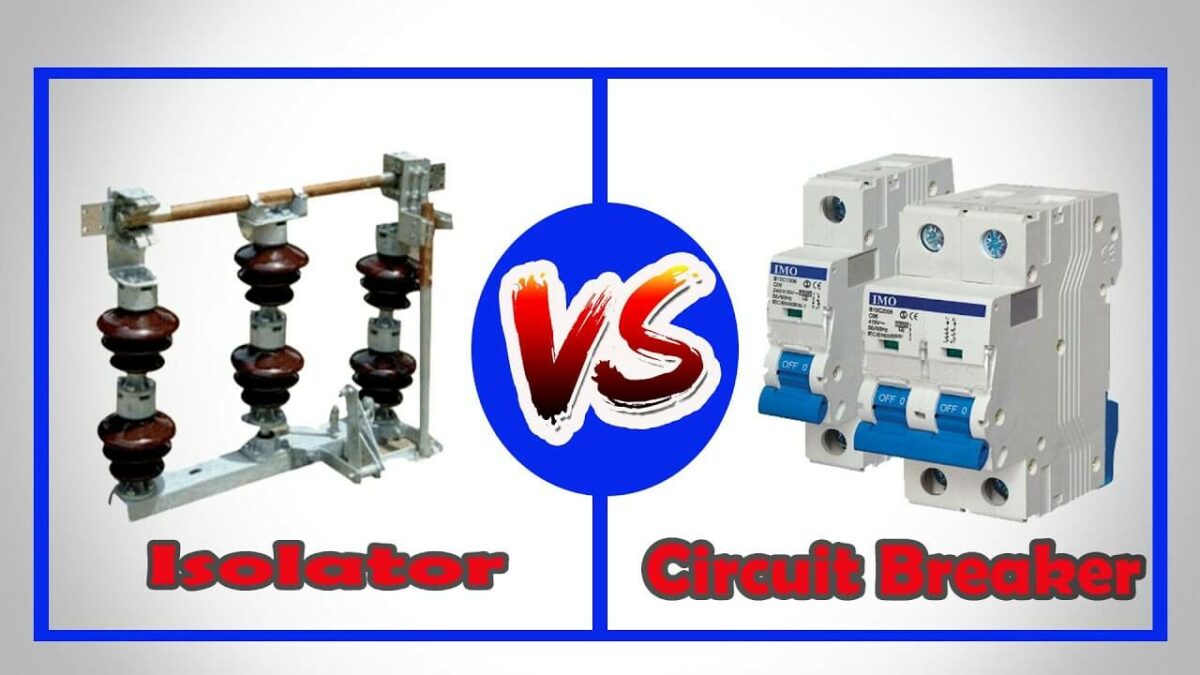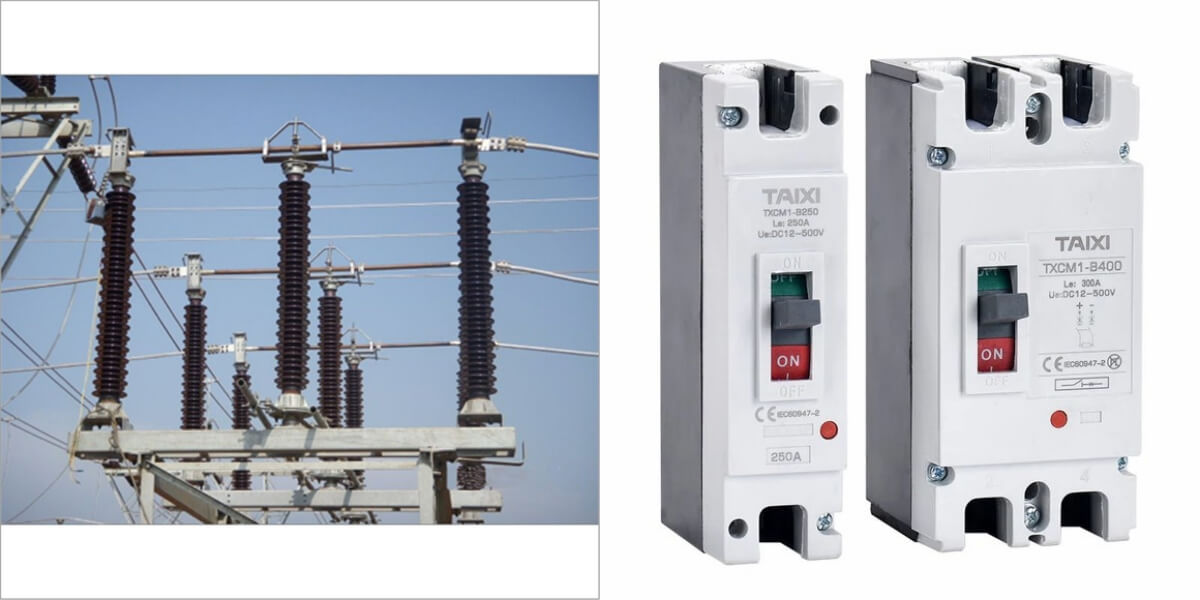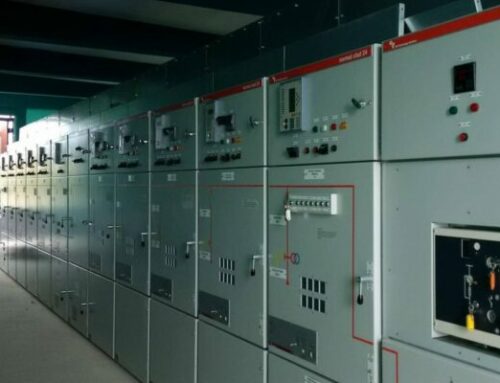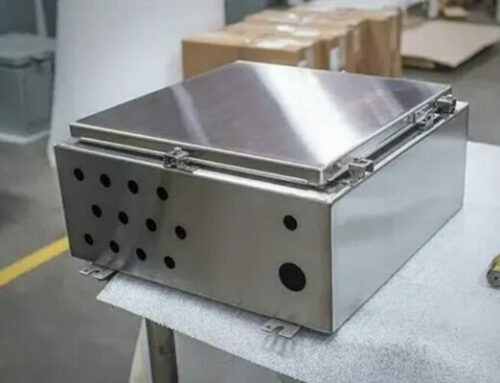To ensure the safe operation of electrical equipment, steps must be taken to ensure that there are no load currents or load faults that would disrupt the smooth operation of the electrical power. A very important set of components that help ensure this is the switchgear assembly. Every electrical installation includes isolators and circuit breakers.
It is impossible to overstate the importance of isolators and circuit breakers, such as MV circuit breakers. They are convincing components in electrical systems. There is often an isolator vs. circuit breaker debate because they are closely related. Both components have a similar function of breaking the circuit when load current problems arise.
However, there are some differences between them. It is very important to resolve the isolator vs. mcb (miniature circuit breaker) debate now so that you do not misunderstand their function and capabilities. Therefore, in the next paragraphs of this article, we will discuss the difference between an isolator and a circuit breaker.
1. What are isolators and disconnectors
Isolators are sometimes called disconnect switches. This is a switching element that only operates under no-load conditions, i.e. it can only operate when there is no current flowing through the circuit. Such switching devices are commonly used to disconnect a part of electrical equipment from the electrical current. Use when performing inspections, maintenance, or repairs; it is a ground disconnect switch that protects the technician and the switchgear from accidental operation.
They also prevent damage to circuit hardware by reducing short circuits and overcurrents and enabling timely maintenance. By separating parts of a circuit, an isolator works. Isolators limit DC signals and allow AC signals to flow. An important factor to be aware of before operating an isolator is that it is a dump switch.
It doesn’t have an arc suppression system built in, so you have to make sure there is zero current through the circuit. This is for security purposes.
2. What is a circuit breaker
Circuit breakers are known as the heart of electrical systems. It is used as a safety device. Its main function is to protect the circuit from overload, fault, and short circuit faults. A circuit breaker detects such a defect and interrupts the flow of electricity to the circuit, preventing further damage. The greater the detected fault intensity, the faster the power failure.
A circuit breaker is like a fuse, it is used to control the flow of electricity, and it can be operated manually and automatically. It also has a built-in fire suppression system, making it capable of interrupting high loads and failures. The arc extinguishing of the high-voltage circuit breaker occurs in a vacuum medium, which can better protect the electrical system. Circuit breakers are ideal for devices that handle high-load currents, such as transformers.
3. What is the difference between an isolator and a circuit breaker?
When you consult load break switch manufacturers for isolators and circuit breakers, you must understand the differences that exist between them. Therefore, in the next series of this article, we will discuss the difference between a circuit breaker and an isolator.
1) Function
The main function of an isolator is to shut off a faulty portion of an electrical system so that it can be repaired safely. This is also done for inspection and maintenance purposes. Circuit breakers are similar to automatic circuit breakers (ACBs). In the event of a failure, it shuts down the entire system.
2) Build
The isolator is a simple mechanical switch; it has no arc suppression system. With an arc suppression system, a circuit breaker is a single box with electromechanical switches and relays.
3) Installation method
The circuit breaker is installed in the circuit with isolators on both sides.
4) Application
Circuit breakers and isolators have another difference: isolators are used in industrial applications, whereas circuit breakers are used in industrial and domestic applications.
5) Dividing ability
Isolators are not used to disconnect load faults. But the circuit breaker has the ability to break the load fault.
6) Affordability
An isolator is an unloading device, which makes it less capable of withstanding current. Use with load will catch fire. On the other hand, a circuit breaker has high withstand capacity because it can regulate the current, even high current.
7) Device type
An isolator is an unloaded device; it can only operate when the current is zero, i.e. when the power is off. A circuit breaker is a load device; it works perfectly when the power is on.
8) Operating conditions
The first condition for operating an isolator is that it must be powered off; it should not be running on a load. A circuit breaker, however, is not subject to any conditions; it can operate under load.
9) Operation method
The isolator cannot be operated automatically, only manually. But the circuit breaker can be operated both automatically and manually.
10) Different media
Isolators use air as the arc extinguishing medium, while circuit breakers use different kinds of media such as air, SF6, and vacuum.
11) Physical contact
The isolator has a main arm and a boom, and since they are important for maintenance, their status can be seen. A circuit breaker has main and arcing contacts, but their physical state cannot be seen.
12) Security
Another point to settle the electrical isolator vs. circuit breaker debate is that isolators put the safety of technicians and switchgear first since their operating conditions dictate that power must be turned off before each operation. Nevertheless, circuit breakers are not very safe; only professionals can operate them safely.
13) Thermal capacity
Isolators do not require insulation or any insulating medium. Insulation is required for circuit breakers, however. Air, oil, vacuum, and SF6 gas are used as the insulating medium of the circuit breaker.
14) Trap fee
In addition, isolators can remove trapped charges, whereas circuit breakers cannot.
15) Interrupt
The isolator interrupts power only during inspection, maintenance, or repair. Circuit breakers, on the other hand, protect circuits from short circuits and overload faults by interrupting the power supply while the circuit is operating.
16) Number of poles
Isolators are designed with a higher number of poles than circuit breakers. This is another difference between isolators and circuit breakers that should be noted.
17) Maintenance
One of the main reasons for installing isolators is for maintenance. They are shut down and maintained to ensure they remain operational. Perform maintenance frequently. But for circuit breakers, maintenance is not very frequent, and when maintenance is required, only trained professional and technical personnel can perform it.
18) Circuit symbols
One obvious difference between an isolator and a circuit breaker is the circuit symbol. An isolator has a horizontal line in its symbol to indicate its isolation capability. On the other hand, a circuit breaker does not have a horizontal line in its symbol.
19) Current operation
Before performing any work on the isolator, the isolator should be disconnected from the power supply. It should not be turned on while the current is still flowing. Regardless of whether the power to the pole is on or not, the circuit breaker can be opened while the current is flowing.
20) Grounding switch
A single or double grounding switch can be included in an isolator, but a grounding switch cannot be included in a circuit breaker.
21) Cost
An isolator costs less; for less money, you can buy it. Circuit breakers, on the other hand, are very expensive. You will have to invest more to buy it.
4. The difference between a miniature circuit breaker and a circuit breaker
When a power surge is detected, both Residual Current Circuit Breakers (RCCBs) and Miniature Circuit Breakers (MCBs) break the current in the circuit. However, they have some differences. They differ primarily in the following ways:
- When a sudden surge of current occurs, the MCB prevents damage to the circuit. The main function of an RCCB is to prevent electric shock; it is designed with personal safety in mind.
- MCB can be used in any environment, be it industrial, domestic, or commercial. The RCCB is mainly used domestically.
- MCB has many poles, including single poles, two poles, three poles, and four poles. RCCBs are like MCBs. They have the same number of poles as MCBs but are not unipolar.
- MCB is less sensitive. RCCBs are more sensitive, which reduces the risk of electric shock.
5. Conclusion
To prevent electrical installations from being damaged by load currents and faults, circuit breakers and isolators are essential components in electrical systems. They help regulate electrical surges. Circuit breakers and isolators perform similar functions, but they have some differences.
In this article, circuit breakers vs. isolators are discussed. As one of the professional and experienced manufacturers of medium voltage switchgear, we have discussed both components and highlighted their differences for easy understanding and identification. In addition, we discuss and differentiate between two main types of circuit breakers – Miniature Circuit Breakers (MCB) and Residual Current Circuit Breakers (RCCB).
How useful was this post?
Click on a star to rate it!
Average rating 5 / 5. Vote count: 2
No votes so far! Be the first to rate this post.






Leave A Comment